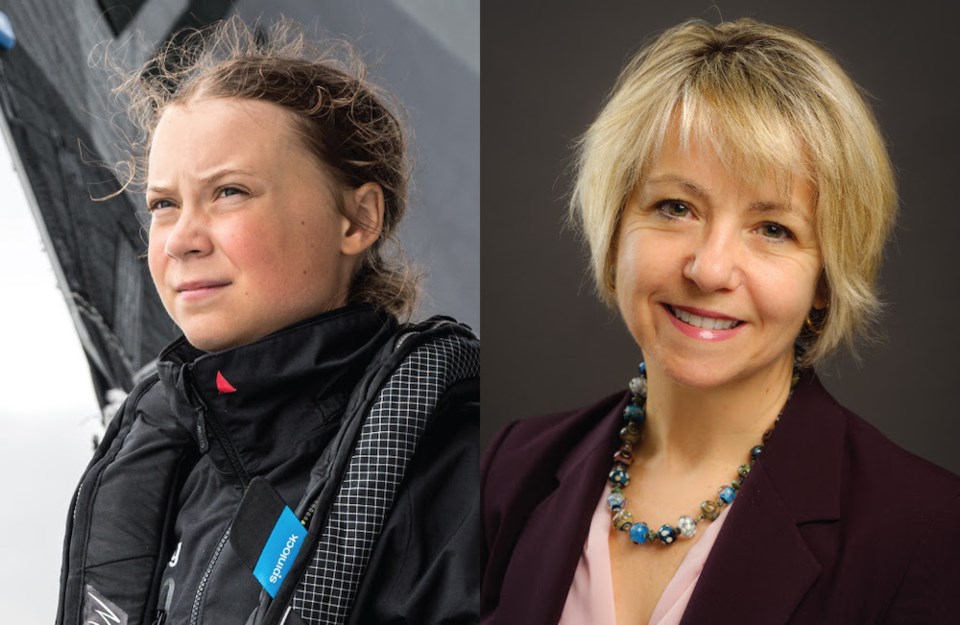The University of British Columbia will bestow honorary degrees to B.C. Provincial Health Officer Dr. Bonnie Henry and internationally renowned climate activist Greta Thunberg this spring.
Dr. Henry will receive her honorary degree from UBC Vancouver, while Thunberg will receive her honorary degree from UBC Okanagan, explains a news release from UBC. They are among 18 individuals who will receive honorary degrees from the university.
“I am delighted to bestow honorary degrees to Dr. Henry and Ms. Thunberg, along with all of our remarkable recipients this spring,” says UBC President and Vice-Chancellor Santa J. Ono.
“Dr. Henry and Ms. Thunberg have served as leading voices in the midst of two of the most significant crises we collectively have ever faced: the global pandemic and climate change. They are truly an inspiration to us all at UBC.”
In recognition of substantial contributions to society
UBC says it confers "honorary degrees—the highest honours conferred by the university," to individuals who have made substantial contributions to society. "Honorary degrees are conferred honoris causa, meaning “for the sake of honour,” and are awarded as one of three types: Doctor of Laws, Doctor of Letters, and Doctor of Science."
Dr. Henry is receiving a Doctor of Science, while Thunberg is receiving a Doctor of Laws.
Dr. Henry is B.C.’s Provincial Health Officer and a former physician epidemiologist for the B.C. Centre for Disease Control. UBC writes that she has been the "calm, assured face of the COVID-19 pandemic response in B.C." and that she led the government response from a "rational, scientific perspective."
Henry's specialized work in public health and preventive medicine also includes
At only 18, Thunberg has gained international acclaim for challenging world leaders to take immediate, science-based action against climate change, and for sparking climate-change activism in many parts of the world.
"A three-time Nobel Peace Prize nominee, she has given speeches at the World Economic Forum in Davos, Switzerland; at the European Parliament; in front of the legislatures of Italy, France, the United Kingdom and the United States; at the 2019 UN Youth Climate Summit in New York, to which she famously travelled on an emissions‐free yacht; and the 2019 UN Climate Change Conference in Madrid."
Eighteen individuals to receive honorary UBC degrees
Together with Dr. Henry and Thunberg, 18 remarkable individuals will receive honorary degrees from UBC.
Below are the additional recipients:
- Theresa Arsenault, an Okanagan business lawyer who established the Aboriginal Access Award at UBCO to help Indigenous students who are encountering financial roadblocks to higher education
- Shashi Assanand, founder and executive director of the Vancouver and Lower Mainland Multicultural Family Support Service Society, which has provided counselling and support to more than 43,000 immigrant and refugee women and children experiencing family violence
- Irwin Cotler, a former Member of Parliament, Minister of Justice and Attorney General of Canada who has been referred to as “Counsel for the Oppressed” and “Freedom’s Counsel,” represents the leading political prisoners in the world today
- Dame Sally Davies, an eminently respected British medical scientist and former Chief Medical Officer for England who was instrumental in creating the National Institute for Health Research, now the largest national clinical research funder in Europe
- Peter Dhillon, a second-generation farmer, entrepreneur and UBC alumnus well known for a wide range of community service and philanthropy in the areas of health care, child humanitarian support, education and sport
- Dr. Victor J. Dzau, an internationally acclaimed scholar in the field of cardiovascular medicine and genetics who helped create the science underlying the class of drugs known as ACE inhibitors, used globally to treat hypertension and heart failure
- Esi Edugyan, a renowned author known for crafting thoughtful and sweeping historical novels that deal with the legacies of race and displacement
- Al Hildebrandt, a Kelowna-based technology entrepreneur with an extraordinary record of community and humanitarian service
- Dr. Tasuku Honjo, a Nobel laureate and renowned Japanese physician-scientist best known for his work in discovering a critical pathway in the immune response to cancer cells
- Dr. Deborah Lipstadt, one of the world’s most eminently regarded Holocaust historians who achieved international recognition when a British writer and Holocaust denier sued her for libel and lost—the sweeping victory of which was depicted in the 2016 film Denial
- Chief Clarence Louie of the Osoyoos Indian Band of the Okanagan Nation, who has consistently emphasized economic development as a means to improve his people’s standard of living
- Garry Merkel, a member of the Tahltan Nation, who has had a long-term interest in the culturally relevant education of Indigenous peoples
- Dr. Heather Munroe-Blum, a distinguished university leader, scholar and accomplished businesswoman who has been an influential advocate for universities as vehicles to advance social and economic growth
- Elder Jessie Nyberg, a member of the Canoe Creek Band of the Secwepmc (Shuswap) Nation, a traditional Indigenous and academic scholar, and visionary leader and community builder
- Elder Roberta Price, a member of the Coast Salish Snuneymuxw and Cowichan Nations, who has been instrumental in helping to create shared spaces for both Indigenous and Western approaches to healing and health for more than 30 years
- Paul Thiele, who overcame his own visual impairment to study comparative literature at UBC, before going on to become the co-founder, architect and head of UBC’s Crane Library, an invaluable resource centre for visually impaired students for more than 50 years



